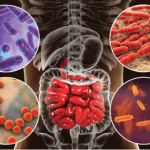Dr. Kriegel thinks there is a need to look at both the human genome and microbiome. He says research should begin to identify a subset of individuals who have both genetic risk factors and autoimmunity-inducing bacteria.
“You really can’t easily change the genome, but you can consider a therapy that removes triggers in the microbiome,” he says. “Although no one has started to look closely at R. intestinalis, I think the microbiome adds to the triggers in autoimmunity, suggesting this [field] is a worthwhile area to work on translating to viable therapies.”
Study ‘Thorough & Robust’
Jessy Alexander, PhD, research professor at Department of Medicine, Jacobs School of Medicine & Biomedical Sciences, University at Buffalo, N.Y., says this research is a thorough and robust study addressing a novel aspect of the gut microbiome.
“The authors have carried out a detailed study using APS as their focus,” she says. “The unique feature is that they show a microbe that normally inhabits the human gut. R. intestinalis, can generate an immune response and trigger an autoimmune condition.”
β2GPI protein is important in clotting, and antibodies to this protein are present in APS patients. This work revealed a possible mechanism showing that R. intestinalis, closely mimics a cryptic antigen sequence of the β2GPI protein exposed after it is unfolded. When inhibited, the results include fetal loss and thromboembolism.
“Because this is a microbe normally present in the gut, clinicians may not give due importance as one of the possible culprits in APS,” says Dr. Alexander. “The microbial balance and homeostasis are important and should be followed with due diligence in APS and other autoimmune diseases.”
Kurt Ullman is a freelance writer based in Indiana.
Reference
- Ruff WE, Dehner C, Kim WJ, et al. Pathogenic autoreactive T and B cells cross-react with mimotopes expressed by a common human gut commensal to trigger autoimmunity. Cell Host Microbe. 2019 Jul 10;26(1):100–113.e8. Epub 2019 Jun 18.


